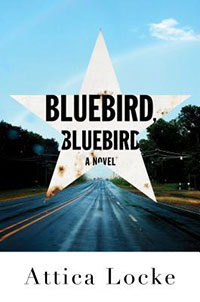
By Dennis Fischman
Any mystery set in the U.S. with a Black main character will have something to say about racism, intentional or not. As I wrote in my review of Blanche Passes Go, by the redoubtable Barbara Neely, “She is an outsider on the inside, a person who can be invisible as she goes about her tasks, yet someone perfectly placed to find out all the things that her employers want to keep secret.” A white woman would not have been quite so invisible. or receive so many secrets. But racism is really the reality in which the book operates, not its subject.
In The Legacy, by Necole Ryse, the murders take place at a “Black Ivy League school.” Nearly all the character are Black, but the need to excel – to show the white world that they are just as good – flavors the story on every page.

Bluebird, Bluebird, by Attica Locke. Thorndike Press, 2017, 443 pages.
Like Ryse, Jonathan Brown, author of The Big Crescendo, won a Barbara Neely Award, but his main character could not be more different. He’s a Black drummer whose day job is helping to run a rent-a-studio for wannabe bands. He’s not an Ivy Leaguer: he’s an Easy Rawlins knockoff. But again, racism mostly lurks in the background. Both books are set in a Black world.
Bluebird, Bluebird, by Attica Locke, is different. Relations between white and Black people are at the core of the story. There are five dead bodies before this book is over, and all of them died partly because of racism (which is why Texas Ranger and former attorney Darren Matthews, a Black man, defies good sense and goes out from Houston to rural Texas, off Highway 59, to investigate – even when he is supposed to be on suspension).
Before the book is over, however, we find that love, lust, greed, and pride can connect people across racial lines as well as make them intensely strange to one another. The setting (the small town of Lark in Shelby County, Texas) is the kind of place where everybody knows everybody and where poor people of every race interact. There are interracial love affairs and – pardon the expression–their strange fruit. And there’s an Aryan Brotherhood, not very smart and not very competent, but a deadly threat to every Black person in town, including, now, our hero.
I’ve enjoyed a few other books by author Attica Locke, especially the two about Jay Porter (Black Water Rising and Pleasantville). This one (the December 2024 pick of the Somerville Public Library Mystery Book Club) is more of a conventional murder mystery than some of the others. What it shares with them is a very deep sense of place and local culture–and how the history of Black people standing up for their dignity, in ways both honorable and twisted, has shaped both the geography and the people.
I’m glad there are more books in the Highway 59 series for me to look forward to.















Reader Comments